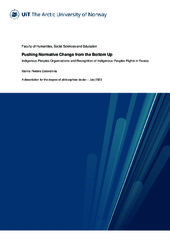| dc.contributor.advisor | Broderstad, Else Grete | |
| dc.contributor.author | Peeters, Marina Goloviznina | |
| dc.date.accessioned | 2023-11-22T22:22:32Z | |
| dc.date.available | 2023-11-22T22:22:32Z | |
| dc.date.embargoEndDate | 2028-12-08 | |
| dc.date.issued | 2023-12-08 | |
| dc.description.abstract | Indigenous peoples and their organizations (IPOs) in the Arctic region and worldwide use international norms to hold governments and extractive corporations accountable for violations of Indigenous peoples’ rights. However, IPOs in undemocratic states face greater obstacles in engaging with these norms, given the government’s limited responsiveness to arguments based on international laws on the rights of Indigenous peoples.
In my thesis, I ask how the IPOs in Russia address the lamentable situation of Indigenous peoples and promote international Indigenous rights norms within the domestic context. Bringing into dialogue governance studies, norm contestation analysis, and social movement scholarship, I highlight the important role of institutions in shaping the trajectories and outcomes of IPOs advocacy and the IPOs’ capacity to recognize and seize opportunities to effect normative change at different levels of Russia’s governance.
The thesis is designed as a comparative multiple-case study that delves into the interactions and institutional settings of national and local IPOs in two ethnic republics of the Arctic Zone of the Russian Federation – the Republics of Komi and Sakha (Yakutia). Drawing on the perspectives of IPOs and amplifying their voices, I argue that the steady activism of domestic IPOs has been the driving force behind the changes in the recognition politics towards Indigenous peoples and their rights in Russia over the last three decades. My findings challenge the popular perceptions of these IPOs as powerless, entirely co-opted, and lacking agency by presenting a more complex and patchy picture of their contestation practices at different levels of natural resource governance. As I showed, despite the constrained environment, these IPOs still utilize tiny but existing opportunities to advocate for increased recognition of Indigenous peoples’ rights and effect some progressive, albeit modest, changes in policy and practice. | en_US |
| dc.description.abstract | Urfolk og deres organisasjoner (IPOer) i den arktiske regionen og over hele verden bruker internasjonale normer for å styrke og holde regjeringer og utvinningsselskaper ansvarlige for brudd på urfolks rettigheter. Imidlertid møter IPOer i udemokratiske stater større hindringer når de engasjerer seg i disse normene, gitt regjeringens begrensede respons på argumenter basert på internasjonale bestemmelser om urfolks rettigheter.
Jeg har spurt hvordan IPOer i Russland adresserer situasjonen til urfolk og hvordan de fremmer internasjonale urfolks rettigheter innenlands. Ved å diskutere governance studier, analyse av normkonflikter og social movement studier, framhever jeg betydningen til IPOene, den viktige rollen deres handlinger og institusjoner har i å forme retning og resultater i kamp for normativ endring på ulike nivå av lovgivning og styring i Russland.
Avhandlingen er utformet som en komparativ multicase-studie som utforsker samhandlingen og institusjonelle forhold til nasjonale og lokale IPOer i to etniske republikker i den russiske føderasjonens arktiske region - republikkene Komi og Sakha (Yakutia). Ved å trekke veklser på IPOenes perspektivee og forsterke stemmene deres, argumenterer jeg for at den jevne aktivismen til innenlandske IPOer har vært drivkraften bak endringene i anerkjennelsespolitikken overfor urfolk og deres rettigheter i Russland de siste tre tiårene. Mine funn utfordrer den folkelige oppfatningen av disse IPOene som maktesløse, fullstendig kooptert og med manglende ‘agency’. Det gjør jeg ved å presentere et mer komplekst og et mangetydig bilde av deres praksis med å bestride gjeldende forhold på ulike nivå knyttet til ressursforvaltning og ressursstyring. Jeg viser at til tross for begrensninger, gjør disse IPOene bruk av små, men eksisterende muligheter til å fremme en styrket anerkjennelse av urfolks rettigheter og til å få gjennomført noen progressive, om enn beskjedne, endringer i politikk og praksis. | en_US |
| dc.description.doctoraltype | ph.d. | en_US |
| dc.description.popularabstract | How do the IPOs in Russia address the lamentable situation of Indigenous peoples and promote international Indigenous rights norms within the domestic context? Popular accounts often portray a one-sided picture of all-powerful authorities, oil and gas companies, and the IPOs lacking the agency to voice dissent in non-democratic Russia. My study of national and local IPOs in the Komi and Sakha (Yakutia) republics challenges the popular perceptions of these IPOs as powerless, entirely co-opted, and lacking agency with more nuanced data on their activities. My findings show that even a closed political regime offers some room for IPOs to contest the misbehavior of government and extractive companies. The IPOs utilize these tiny but existing opportunities to advocate for advancing the recognition of Indigenous peoples’ rights, using the normative power of international norms. | en_US |
| dc.description.sponsorship | The dissertation was funded by the UiT The Arctic University of Norway - Research Fellow Scholarship (Kap.0281).
In 2018, I was supported by the Norwegian University Centre in St. Petersburg for my fieldwork trips to Saint Petersburg and Moscow. | en_US |
| dc.identifier.uri | https://hdl.handle.net/10037/31855 | |
| dc.language.iso | eng | en_US |
| dc.publisher | UiT Norges arktiske universitet | en_US |
| dc.publisher | UiT The Arctic University of Norway | en_US |
| dc.relation.haspart | <p>Paper I: Peeters, M.G. (2019). Indigenous Agency and Normative Change from ‘Below’ in Russia: Izhma-Komi’s Perspective on Governance and Recognition. <i>Arctic Review on Law and Politics, 10</i>, 142-164. Also available in Munin at <a href=https://hdl.handle.net/10037/16527>https://hdl.handle.net/10037/16527</a>.
<p>Paper II: Peeters, M.G. (2021). Indigenous agency through normative contestation: defining the scope of free, prior and informed consent in the Russian North. Chapter 5 in Tennberg, N.M., Broderstad, E.G. & Hernes, H.-K. (Eds.), <i> Indigenous Peoples, Natural Resources and Governance. Agencies and Interactions</i> (pp 85-103). Routledge. Also available at <a href=https://doi.org/10.4324/9781003131274-5> https://doi.org/10.4324/9781003131274-5</a>.
<p>Paper III: Peeters, M.G. (2022). The Agencies of the 'Co-Opted': Indigenous Peoples Organisations and Contestation of International Indigenous Rights Norms in Russia. <i>International Journal on Minority and Group Rights, 29</i>(5), 849-876. Published version not available in Munin due to publisher’s restrictions. Published version available at <a href=https://doi.org/10.1163/15718115-bja10076>https://doi.org/10.1163/15718115-bja10076</a>. Accepted manuscript version available in Munin at <a href=https://hdl.handle.net/10037/28346>https://hdl.handle.net/10037/28346</a>. | en_US |
| dc.rights.accessRights | embargoedAccess | en_US |
| dc.rights.holder | Copyright 2023 The Author(s) | |
| dc.rights.uri | https://creativecommons.org/licenses/by-nc-sa/4.0 | en_US |
| dc.rights | Attribution-NonCommercial-ShareAlike 4.0 International (CC BY-NC-SA 4.0) | en_US |
| dc.subject | VDP::Social science: 200::Sociology: 220 | en_US |
| dc.subject | VDP::Samfunnsvitenskap: 200::Sosiologi: 220 | en_US |
| dc.title | Pushing Normative Change from the Bottom Up. Indigenous Peoples Organizations and Recognition of Indigenous Peoples Rights in Russia | en_US |
| dc.type | Doctoral thesis | en_US |
| dc.type | Doktorgradsavhandling | en_US |


 English
English norsk
norsk

